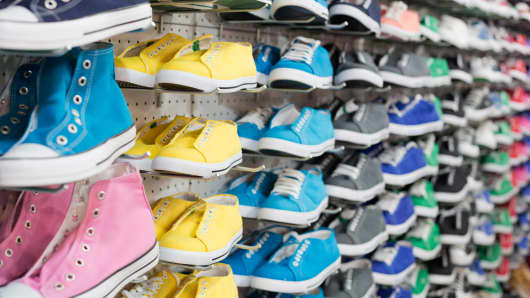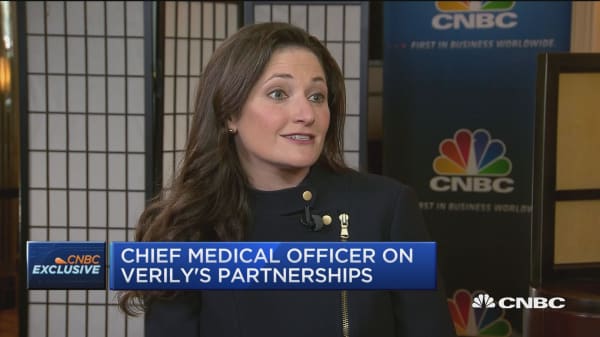Alphabet’s Verily has been working on health-tracking shoes to measure movement, weight and falls
- Alphabet’s Verily has been showing off a prototype of shoes that can track weight, movement, and potentially even detect falls.
- The Google sister company has pitched the prototype in hopes of securing a co-development partner, according to two people familiar.
- Verily’s team is working on a wide range of health-related hardware projects, including “smart” contact lenses and a “smart” spoon to make it easier for people with movement disorders to eat.
Alphabet’s life sciences arm, Verily, has been looking for partners to co-develop shoes with sensors embedded to monitor the wearer’s movement and weight, as well as to measure falls, CNBC has learned.
Three people familiar with the project say that the Google sister company has in recent months shown a prototype of the design in private meetings, hoping to attract partners to build the shoes and take them to market. It is not known whether the project is still active.
If Verily progresses with the project, the shoes could have a wide range of health-related uses. For instance, sudden weight gain can be a sign that the body is retaining fluid, which is a symptom of congestive heart failure. Another area of interest is fall detection, two of the people said, which could be useful for seniors in particular.
Verily did not respond to a request for comment.
Apple recently introduced fall detection into its latest Apple Watch, which also provides a way for users to reach emergency services in the event of a more serious tumble.
Verily was previously known as Google Life Sciences, but in 2015 it became a separate company under Google’s parent company, Alphabet, and is tracked financially within Alphabet’s “Other Bets” segment. In January, it raised $1 billion from Silver Lake and othersto “increase flexibility and optionality,” according to the company’s CEO Andy Conrad, which could be an indicator of a potential spin-out from Alphabet.
The company has recruited dozens of engineers, scientists and health experts to its ranks. Many of its technical leads originally worked at Google.
Thus far, Verily has found success in teaming up with larger companies to develop and potentially commercialize its project ideas.
Aside from the shoes, Verily is working on several other hardware projects, including a stabilizing spoon to help people with movement disorders eat, a smartwatch for its clinical research efforts and a “smart” contact lens for age-related farsightedness or improving sight after a cataract surgery.
Discover more from ReviewFitHealth.com
Subscribe to get the latest posts sent to your email.

